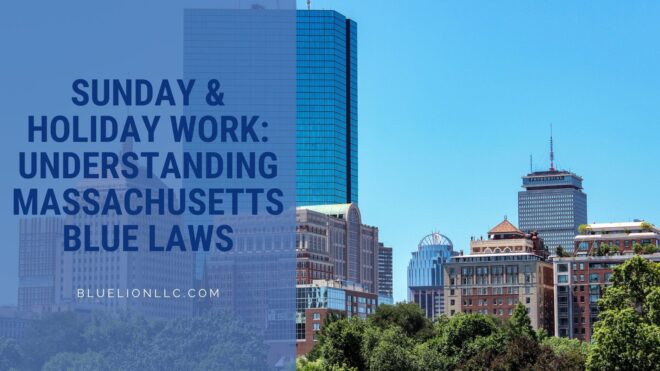
There are many labor laws Massachusetts employers must be aware of, such as the state’s specific sick leave laws. Then there are the Massachusetts Blue Laws, which contain specific requirements regarding time and pay for employees who work on Sundays or certain holidays.
So, how do you know if your business must comply with the Blue Laws? And if so, how do you compensate employees accordingly? Read on as we review these laws, who has to comply, which holidays are covered, and premium pay rates.
What are the Massachusetts Blue Laws?
The Massachusetts Blue Laws regulate the hours of operation for certain retail and non-retail businesses and require some employers to pay extra compensation (i.e., “premium pay”) on Sundays and some legal holidays.
The Attorney General’s Office enforces these laws. The Department of Labor Standards (DLS) approves local permits allowing businesses to open on Sundays and select legal holidays, when they normally could not open for some or all hours on those days. There are 55 exemptions that allow work on Sundays and legal holidays (e.g., restaurants, pharmacies, and hotels).
Operating on Sundays
Retail Establishments
Retailers can open at any time on Sunday without approval and permit requirements. Most retailers who employ more than seven workers, including the owner, must pay employees at least a premium rate on Sundays. You do not have to pay this higher rate to bona fide executive, administrative, or professional employees.
The current premium pay rates are:
- 2021: 1.2x regular rate
- 2022: 1.1x regular rate
Note that the premium pay rate requirement will be phased out by January 1, 2023.
Voluntariness of Employment
The voluntary employment requirement mandates that most retailers cannot require employees to work on Sunday, nor can they discipline or retaliate against staff in any way for refusing to work on a Sunday.
Non-retail Establishments
Non-retail businesses can only operate on Sundays if they fall within one of the 55 exemptions.
All businesses can request a permit for work on Sundays from the police department of the city or town where the company is located. Permits are issued only for “necessary work or labor which could not be performed on any other day without serious suffering, loss, damage, or public inconvenience, or which could not be performed on any other day without delay to military defense work.”
Manufacturers
While Massachusetts manufacturers are not allowed to open on Sundays, they can petition the Attorney General for a temporary exemption from the restriction. The law also states that manufacturers can operate on Sundays without a permit when “manufacturing processes which for technical reasons require continuous operations.”
Operating on Holidays
Retail Establishments
On unrestricted holidays, Massachusetts retail businesses can operate without a permit and do not need to provide premium pay. Voluntariness of employment requirements do not apply. Unrestricted holidays include:
- Martin Luther King Jr. Day
- Presidents’ Day
- Evacuation Day
- Patriots’ Day
- Bunker Hill Day
On partially restricted holidays, retailers may operate without a permit but must provide premium pay and abide by the voluntariness of employment requirements. These holidays include:
- New Year’s Day
- Memorial Day*
- Juneteenth Independence Day*
- Independence Day*
- Labor Day*
- Columbus Day after 12:00 p.m.
- Veterans Day after 1:00 p.m.
*Premium pay is required only for retailers with more than seven employees, including the owner.
The current premium pay rates are:
- 2021: 1.2x regular rate (New Year’s Day only 1.5x regular rate)
- 2022: 1.1x regular rate
The holiday premium pay rates will also be eliminated as of January 1, 2023.
For restricted holidays, the DLS may issue a statewide approval of permits. This means retailers may perform work if they have obtained a local police permit. Employers must provide premium pay and follow the voluntariness of employment requirements.
Restricted holidays include:
- Columbus Day before 12:00 p.m.
- Veterans Day before 1:00 p.m.
- Thanksgiving Day
- Christmas Day
Non-retail Establishments
The Massachusetts Blue Laws state that most non-retail businesses may operate on the following legal holidays, without permit or restrictions:
- New Year’s Day
- Martin Luther King Jr. Day
- Presidents’ Day
- Evacuation Day
- Patriots’ Day
- Bunker Hill Day
- Juneteenth Independence Day
- Columbus Day after 12:00 p.m.
- Veterans Day after 1:00 p.m.
Most non-retail employers in the Bay State cannot operate on any other legal holidays unless they fit one of the state’s exemptions.
Manufacturers
Manufacturers may operate on unrestricted holidays without a permit and do not have to provide premium pay. These holidays include:
- New Year’s Day
- Martin Luther King Jr. Day
- Presidents’ Day
- Evacuation Day
- Patriots’ Day
- Bunker Hill Day
- Juneteenth Independence Day
- Columbus Day after 12:00 p.m.
- Veterans Day after 1:00 p.m.
Manufacturers may not operate on the restricted holidays below unless granted a permit by local police:
- Memorial Day
- Independence Day
- Labor Day
- Columbus Day before 12:00 p.m.
- Veterans Day before 1:00 p.m.
- Thanksgiving Day
- Christmas Day
Overall, manufacturers cannot force employees to work on holidays unless the work “is both absolutely necessary and can lawfully be performed on Sunday.”
Comply with Massachusetts Blue Laws
To ensure you comply with the Massachusetts Blue Laws as they apply to your business, you must know how your company is classified. It’s also crucial that you keep diligent records of employees’ time worked and denote their Sunday and holiday time and pay.
If you are a Massachusetts employer with questions about the Blue Laws and want to ensure you are compensating your employees appropriately, contact BlueLion today at 603-818-4131 or info@bluelionllc.com. Our human resources experts know the ins and outs of Massachusetts labor laws and will help you review your business practices and policies.
The information on this website, including its newsletters, is not, nor is it intended to be legal advice. You should contact an attorney or HR specialist for advice on your individual situation.



